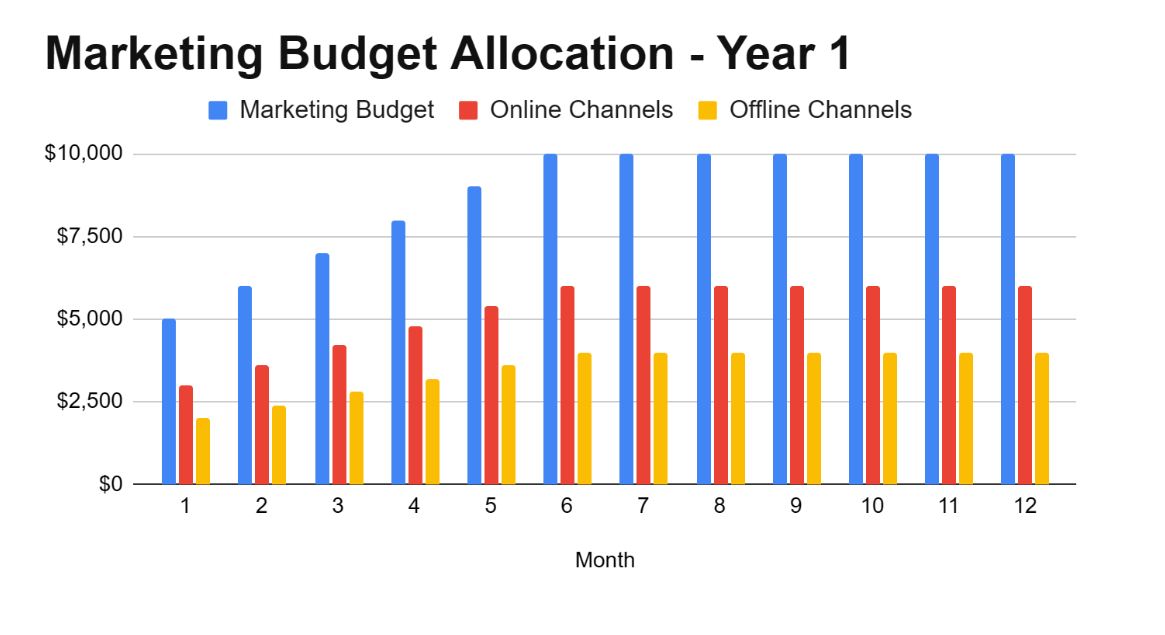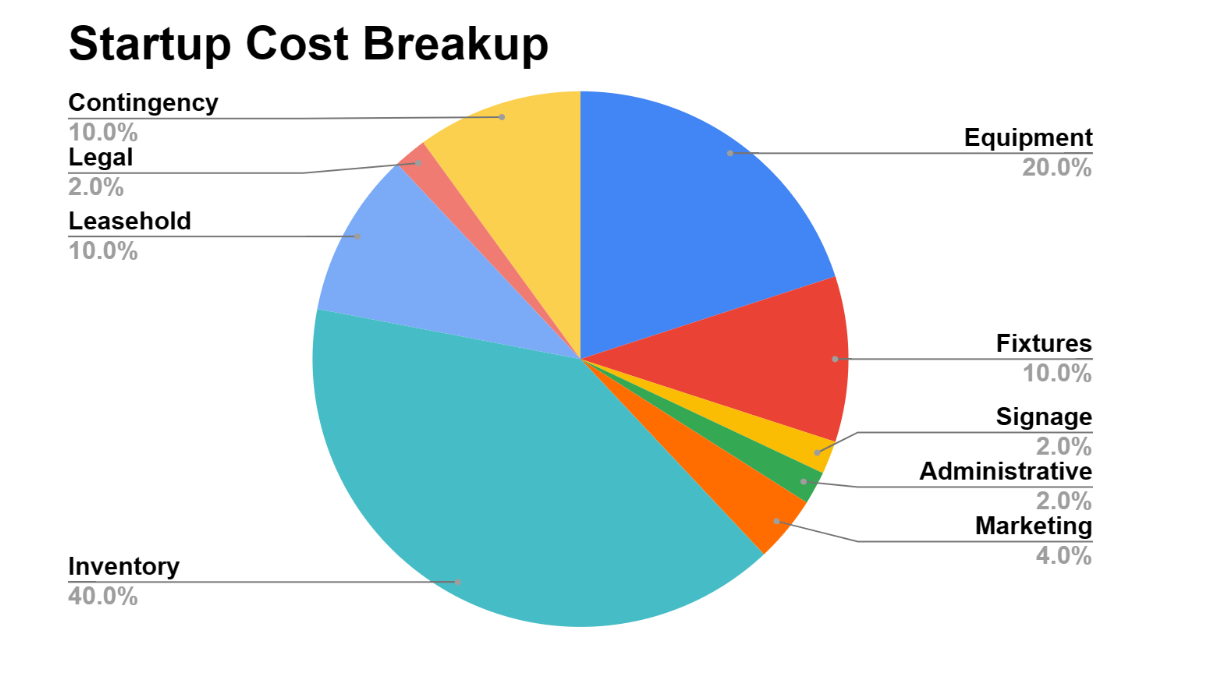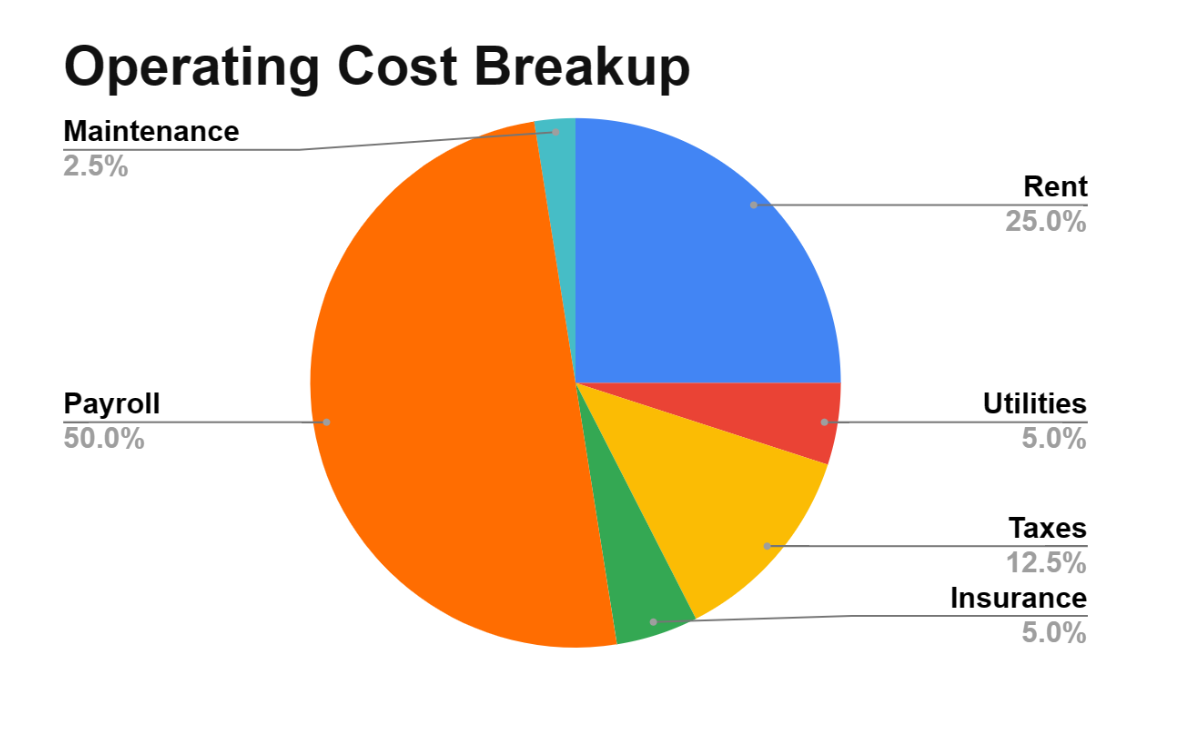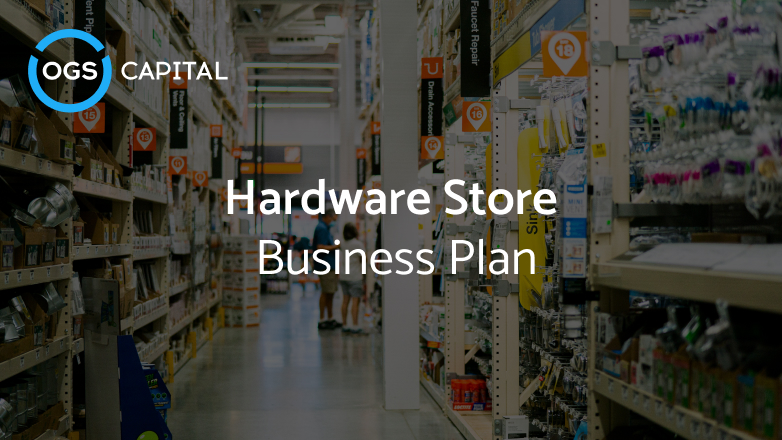Table of Content
A hardware store is a retail business that sells tools, materials, and equipment for home improvement, construction, and maintenance projects. Hardware stores can cater to different segments of customers and can also offer services such as installation, repair, and consultation, as we explained in our Hardware Retail Franchise Business Plan.
What is the Business Plan for a Retail Hardware Store?
A business plan for a retail hardware store is a document that outlines the goals, strategies, and financial projections of a store that sells hardware products and supplies to customers. A business plan typically includes the following sections:
- Executive summary
- Company description
- Products and services
- Market analysis
- Competitive analysis
- Marketing and sales strategy
- Management and organization
- Financial plan
- Appendix
Why Do You Need a Business Plan Sample for a Hardware Shop?
A hardware shop needs a business plan sample to outline its vision, goals, and strategies. It can show how the shop will operate, what products and services it will offer, and how it will reach its target market. A business plan sample, like a Computer Software Business Plan, can also demonstrate the financial viability of the shop and attract funding and support from various stakeholders. A business plan sample is a vital document for any hardware shop owner who wants to start or grow their business.
Here is an example of a retail hardware store business plan sample:
Executive Summary
Ace Hardware is a new hardware store that will be located in San Diego, California. Ace Hardware will operate as a sole proprietorship owned by Alex Hales, an experienced and certified hardware professional.
Ace Hardware will target residential and commercial customers in the San Diego area who are looking for a convenient, reliable, and friendly hardware store. Ace Hardware will focus on the following customer segments:
- DIY enthusiasts
- Contractors
- Homeowners
- Hobbyists
Ace Hardware will require a total of $500,000 to start and operate the business. Ace Hardware is seeking a $300,000 loan from a reputable bank to finance the startup and operating costs of the business. The loan will be repaid in 5 years with an interest rate of 10%. Ace Hardware will also contribute $200,000 of the owner’s savings as equity.
Company Overview
Ace Hardware is a new hardware store that will be located on Main Street, San Diego, California. The store will occupy a 5,000-square-foot space in a busy and convenient shopping plaza, with ample parking and visibility. The store will be open from 8 a.m. to 8 p.m., seven days a week.
Ace Hardware will be registered as a limited liability company (LLC) in the state of California and will comply with all the relevant federal, state, and local laws and regulations. The store will be owned and operated by Alex Hales, who will also serve as the manager and the chief executive officer (CEO) of the company. Alex Hales will own 100% of the company’s shares and will have complete control over the business decisions and operations.
Industry Analysis

The hardware store industry is a segment of the larger home improvement industry. It includes businesses that sell tools, materials, and equipment for home improvement, construction, and maintenance projects.
Here are some interesting market insights for DIY & Hardware Store in the United States:
- The global hardware market size amounts to $121.34 bn in 2023 and is expected to grow to $164.21 bn in 2027. (Source – The Business Research Company)
- The revenue generated in the DIY & Hardware Store market in 2023 amounts to $641.80 bn. (Source – Statista)
- It is projected that the hardware market will experience an annual growth rate of 2.63% from 2023 to 2028. (Source – Statista)
Customer Analysis
Ace Hardware’s target market is the home improvement market in San Diego, California. This market consists of customers who are looking for products and services for home improvement, construction, and maintenance projects.
According to the US Census Bureau, there were 1,419,845 housing units in San Diego County in 2020, of which 56.4% were owner-occupied and 43.6% were renter-occupied. The median value of owner-occupied housing units was $632,000, and the median monthly rent was $1,647. The median household income was $85,507, and the per capita income was $38,923.
Ace Hardware’s customer segments are:
1. Residential customers
- These are homeowners or renters who are looking for products and services for their own home improvement, construction, and maintenance projects.
- They have different levels of skills, budgets, and tastes and may seek advice, guidance, and assistance from hardware store staff.
- They also value convenience, quality, and variety in their purchases.
Ace Hardware will target residential customers who live or work within a 10-mile radius of the store location and who have a household income of $50,000 or more. Ace Hardware estimates that there are about 500,000 potential residential customers in this segment.
2. Commercial customers
- are contractors, builders, landscapers, decorators, and other professionals who are looking for products and services for their clients’ home improvement, construction, and maintenance projects.
- They have specific requirements, standards, and deadlines and may seek reliability, efficiency, and flexibility from hardware store staff.
- They also value price, quality, and availability in their purchases.
Ace Hardware will target commercial customers who operate within a 20-mile radius of the store location and who have an annual revenue of $100,000 or more. Ace Hardware estimates that there are about 10,000 potential commercial customers in this segment.
Competitive Analysis
ABC Hardware faces competition from other hardware stores in the area, such as:
- Home Depot – Home Depot is the largest home improvement retailer in the US, with over 2,300 stores nationwide, including 20 stores in San Diego County. Home Depot offers a wide range of products and services for home improvement, construction, and maintenance projects. Home Depot’s strengths include its large scale, brand recognition, loyal customer base, and online presence. Home Depot’s weaknesses include its high operating costs, low customer service, and generic product selection.
- Lowe’s – Lowe’s is the second largest home improvement retailer in the US, with over 1,700 stores nationwide, including 15 stores in San Diego County. Lowe’s offers a similar range of products and services as Home Depot but with a focus on home decoration and design. Lowe’s strengths include its brand recognition, loyal customer base, and online presence. Lowe’s weaknesses include its high operating costs, low customer service, and generic product selection.
- Menards – Menards is the third largest home improvement retailer in the US, with over 300 stores in 15 states, including 5 stores in California. Menards offers a similar range of products and services as Home Depot and Lowe’s but with a focus on price and value. Menards’ strengths include its low prices, loyal customer base, and online presence. Menards’ weaknesses include its limited geographic coverage, low customer service, and generic product selection.
ABC Hardware assesses and rates its competitive advantages and disadvantages based on a 1-5 scale rating. ABC Hardware’s competitive advantages and disadvantages are as follows:
| Criteria | ABC Hardware | Home Depot | Lowe’s | Ace Hardware | True Value |
| Products | 4 | 3 | 3 | 4 | 4 |
| Services | 4 | 2 | 2 | 4 | 4 |
| Prices | 4 | 3 | 3 | 2 | 2 |
| Locations | 4 | 2 | 2 | 3 | 3 |
| Marketing strategies | 4 | 3 | 3 | 2 | 2 |
| Total | 20 | 13 | 13 | 15 | 15 |
Marketing Plan
ABC Hardware’s marketing objectives and goals are to:
- Increase the brand awareness and recognition of ABC Hardware in the local market and online platforms
- Attract and retain at least 1,000 loyal customers by the end of the first year
- Achieve a monthly sales revenue of $100,000 by the end of the first year
- Increase the customer engagement and loyalty by 10% by the end of the first year
- Generate at least 100 referrals and word-of-mouth per month by the end of the first year
ABC Hardware’s marketing mix is based on the following four Ps:
- Product – ABC Hardware offers high-quality tools, materials, and equipment for home improvement, construction, and maintenance projects at affordable prices. ABC Hardware also offers installation, repair, and consultation services to its customers.
- Price – ABC Hardware sets its prices based on the cost-plus pricing strategy, which adds a markup percentage to the cost of the products and services. ABC Hardware’s markup percentage is 30%, which covers its overhead and profit margin.
- Place – ABC Hardware sells its products and services through its physical store and its online store. The physical store is located in a busy and central area with high foot traffic and visibility. The online store is accessible through its website, which is user-friendly, secure, and responsive.
- Promotion – ABC Hardware uses a combination of online and offline channels to promote its brand, products, and services to its target customers.
ABC Hardware’s marketing budget and allocation are based on the following assumptions and estimates:
- ABC Hardware allocates 10% of its monthly sales revenue to its marketing budget
- ABC Hardware spends 60% of its marketing budget on online channels and 40% on offline channels
- ABC Hardware tracks and measures the return on investment (ROI) and cost per acquisition (CPA) of each marketing channel
ABC Hardware’s marketing budget and allocation for the first year are represented in the following chart:

Operations Plan
ABC Hardware’s operations plan covers the following aspects of its business:
- Location – The store location is 123 Main Street, Los Angeles, CA 90001, which is a busy and central area with high foot traffic and visibility. It is close to its target customers, has low rent and utilities costs, and has ample parking space and public transportation access.
- Size – The store has a size of 5,000 square feet, which is enough to accommodate its products, services, staff, and customers. ABC Hardware plans to expand its store size to 10,000 square feet by the end of the third year.
- Layout – The store is divided into four main sections: tools, materials, equipment, and services. ABC Hardware also has a checkout counter, a customer service desk, a storage room, and a restroom.
- Inventory management – ABC Hardware uses a barcode scanner and a point-of-sale (POS) system to record and monitor sales and inventory transactions. ABC Hardware also uses a software program and a database to analyze and forecast inventory levels and trends. Refer to our SaaS Business Plan for a better understanding.
- Procurement – ABC Hardware sources its products and services from reliable and reputable suppliers and vendors. ABC Hardware has established long-term and mutually beneficial relationships with its suppliers and vendors.
- Equipment – ABC Hardware uses various equipment and tools to operate and manage its store, such as:
- Barcode scanner
- POS system
- Computer
- Printer
- Phone
- Security camera
- Alarm system
- Fire extinguisher
Organization and Management
Ace Hardware will have a simple and flat organizational structure, where the owner and manager will have direct and close supervision and communication with the staff. The organizational structure will consist of the following positions:
- Owner and Manager – Alex Hales, the owner, manager, and CEO of the store, will oversee all aspects of the business, from planning and budgeting to hiring and reporting. He has a business degree and 10 years of experience in the hardware store industry.
- Sales Staff – 10 sales staff will be hired to assist and serve the customers, as well as sell and provide various services on the sales floor. They will have 2 years of experience and a high school diploma and will work in shifts of 5 under the owner and manager.
- Cashier Staff – 3 cashier staff will be hired who will process and complete the transactions, as well as perform checkout and customer service tasks. They will have 1 year of experience and a high school diploma and will work in shifts of 2 or 3 under the owner and manager.
Financial Plan
Startup Costs
Ace Hardware will require a total of $500,000 to start and operate the business. The startup costs will include the purchase of inventory, equipment, fixtures, signage, and leasehold improvements, as well as the initial marketing, legal, and administrative expenses. The breakdown of the startup costs is as follows:

Operating Costs
Ace Hardware will incur monthly operating costs to run and operate the business. The operating costs will include the rent, utilities, payroll, taxes, insurance, and maintenance expenses. The breakdown of the operating costs is as follows:

Revenue
Ace Hardware will generate revenue from the sale of products and services, such as paint, plumbing, electrical, gardening, hardware, lumber, cutting, installation, repair, and delivery. Ace Hardware will use the following assumptions to project its revenue:
- Average sale per customer: $50
- Average number of customers per day: 100
- Average number of days per month: 30
- Average revenue per month: $50 x 100 x 30 = $150,000
- Average revenue growth rate per year: 10%
Based on these assumptions, Ace Hardware projects to generate $1.2 million in sales revenue in the first year, $1.8 million in the second year, and $2.4 million in the third year.
Break-Even Analysis
Ace Hardware expects to achieve break-even in the first year of operation, where its total revenue will equal its total costs. Ace Hardware will use the following formula to calculate its break-even point:
Break-Even Point = Fixed Costs / (Revenue per Unit – Variable Cost per Unit)
- Fixed Costs: $32,000 per month, or $384,000 per year.
- Revenue per Unit: $50 per unit.
- Variable Cost per Unit: $25, or 50% of the revenue per unit.
Based on these figures, Ace Hardware’s break-even point will be:
- Break-Even Point = $384,000 / ($50 – $25) = 15,360 units
- Break-Even Point in Sales = 15,360 x $50 = $768,000
This means that Ace Hardware will need to sell 15,360 units or generate $768,000 in sales revenue to cover its costs and break even.
Cash Flow Statement
| Item | Year 1 | Year 2 | Year 3 |
| Operating Activities | |||
| Net Income | $96,000 | $216,000 | $336,000 |
| Depreciation | $20,000 | $20,000 | $20,000 |
| Changes in Working Capital | -$50,000 | $0 | $0 |
| Net Cash from Operating Activities | $66,000 | $236,000 | $356,000 |
| Investing Activities | |||
| Purchase of Equipment | -$100,000 | $0 | $0 |
| Purchase of Leasehold Improvements | -$50,000 | $0 | $0 |
| Net Cash from Investing Activities | -$150,000 | $0 | $0 |
| Financing Activities | |||
| Loan Proceeds | $300,000 | $0 | $0 |
| Loan Repayments | -$60,000 | -$60,000 | -$60,000 |
| Interest Payments | -$30,000 | -$24,000 | -$18,000 |
| Owner’s Equity | $200,000 | $0 | $0 |
| Net Cash from Financing Activities | $410,000 | -$84,000 | -$78,000 |
| Net Change in Cash | $326,000 | $152,000 | $278,000 |
| Cash at Beginning of Period | $0 | $326,000 | $478,000 |
| Cash at End of Period | $326,000 | $478,000 | $756,000 |
Income Statement
| Item | Year 1 | Year 2 | Year 3 |
| Revenue | $1,200,000 | $1,800,000 | $2,400,000 |
| Cost of Goods Sold | -$600,000 | -$900,000 | -$1,200,000 |
| Gross Profit | $600,000 | $900,000 | $1,200,000 |
| Operating Expenses | -$480,000 | -$480,000 | -$480,000 |
| Operating Income | $120,000 | $420,000 | $720,000 |
| Interest Expense | -$30,000 | -$24,000 | -$18,000 |
| Net Income Before Taxes | $90,000 | $396,000 | $702,000 |
| Taxes (30%) | -$27,000 | -$118,800 | -$210,600 |
| Net Income | $63,000 | $277,200 | $491,400 |
Balance Sheet
| Item | Year 1 | Year 2 | Year 3 |
| Assets | |||
| Cash | $326,000 | $478,000 | $756,000 |
| Inventory | $200,000 | $300,000 | $400,000 |
| Equipment | $100,000 | $100,000 | $100,000 |
| Leasehold Improvements | $50,000 | $50,000 | $50,000 |
| Total Assets | $676,000 | $928,000 | $1,306,000 |
| Liabilities | |||
| Loan | $240,000 | $180,000 | $120,000 |
| Accounts Payable | $50,000 | $75,000 | $100,000 |
| Total Liabilities | $290,000 | $255,000 | $220,000 |
| Equity | |||
| Owner’s Equity | $200,000 | $200,000 | $200,000 |
| Retained Earnings | $63,000 | $340,200 | $831,600 |
| Total Equity | $263,000 | $540,200 | $1,031,600 |
| Total Liabilities and Equity | $553,000 | $795,200 | $1,251,600 |
Why Choose OGSCapital for Your Hardware Store Business Plan?
At OGSCapital, we are the leading provider of business plan services for businesses of all sizes. We have a team of senior business experts with 15+ years of experience in 45 industries who can create customized and unique business plans that meet the highest standards of quality, professionalism, and effectiveness. We also offer comprehensive and in-depth market research, fast and reliable results, a proven track record of success, and access to a wide network of contacts. For reference, check our Computer Repair Business Plan.
Contact us today and get a free consultation from one of our business plan experts. We will help you achieve your business goals and become a market leader.
Frequently Asked Questions
Is a hardware shop profitable?
Hardware shop business is profitable in the US, as it sells essential tools and materials for home improvement and construction projects. The profit margin in hardware stores in the US is estimated to be around 15% to 30%, depending on the type and category of products sold. Check our iPhone Repair Business Plan here.
How do I start a hardware business?
To open a hardware store business, you need to conduct market research, write a hardware business plan, choose a suitable location, obtain the necessary licenses and permits, source your products, hire and train your staff, promote your business, and provide quality products and services.
How do I write a business plan for a hardware store?
A small hardware store business plan is a document that describes the details and objectives of your business and how you plan to achieve them. It should include the sections of executive summary, market analysis, products and services, marketing plan, operational plan, financials, and appendix. Refer to our Web Hosting Business Plan to learn more.
What is the business category of a hardware store?
A hardware store is a type of retail store that sells a variety of tools, materials, and supplies for home improvement, construction, gardening, and other activities. Hardware stores are usually classified under the NAICS Code 444130, SIC Code 5251, and Business Activity Code 444000.
OGSCapital’s team has assisted thousands of entrepreneurs with top-rate business plan development, consultancy and analysis. They’ve helped thousands of SME owners secure more than $1.5 billion in funding, and they can do the same for you.



















